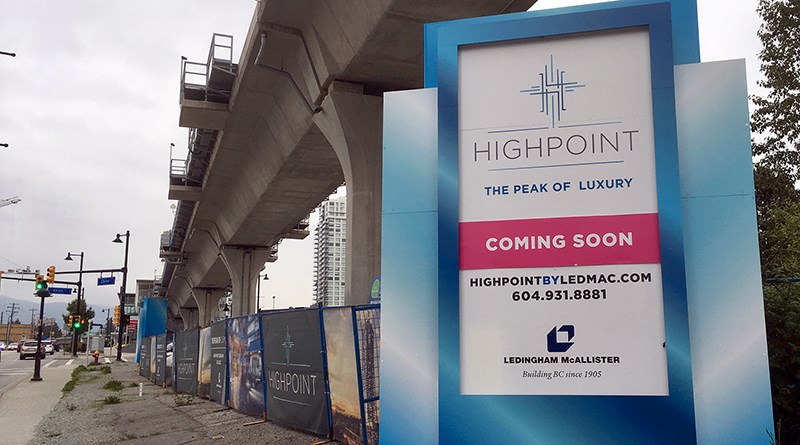New sign guidelines designed to deter developers from marketing their projects before they're approved by city council are being finalized in Coquitlam.
Jim McIntyre, the general manager of planning and development, said the booklet, which will be available at city hall and at coquitlam.ca, clarifies what is — and is not — permitted.
While most developers are respectful of the municipal process, McIntyre said, there have been incidents where companies have started advertising their buildings before the developments have received the final sign-off from council.
“At the very least, you are being impolite to the city and disrespectful of our approval process,” he said. “If there is anything [on the signs] that convey this is a done deal, that would be very troubling.”
Development signage is regulated by the Real Estate Marketing Act (REDMA), which is administered by the province's Office of the Superintendent of Real Estate.
Enforcing rules around project advertising is tricky because different types of signs are allowed at various phases of construction. For example, hoarding signs — essentially the fencing that often surrounds project sites — are permitted prior to a development application submission and can include the company name, logo, photos and artistic renderings.
After an application is submitted, and during second and third readings and public hearing, signs that include the company and contractors' names and the nature of the project are allowed, provided they do not include marketing information for the sale of units.
Once a project receives its final approval, only then can a developer set up its sales centre and directional advertising signs. The advertisements are temporarily allowed on public property provided they adhere to certain requirements, including being freestanding or sandwich board designs under 0.9 by 0.6 metres. They are permitted at the four intersections nearest to the sales centre and generally have arrows pointing toward the marketing office.
While the signs are provincially regulated, staff said they can advise developers when it is appropriate to post advertising.
“For example, if a hoarding sign is installed on a development project site advertising ‘ABC Project Coming Soon, Contact ABC Construction’ prior to public hearing or council approvals, staff would ask the developer to remove the hoarding sign until all necessary approvals are obtained,” said the staff report.
Having a standardized set of guidelines, McIntyre added, will make it easier for bylaw enforcement to be aware of the rules and keep an eye out for signs that may run afoul of the regulations.
Still, some at the council table felt the guidelines do not go far enough.
Coun. Craig Hodge said it is problematic when developers put pictures of their proposed projects on their signs because it gives residents the impression the project has already been approved.
“What bothers me… is the perception before it comes to public hearing that we are about to approve a 36-storey tower or whatever,” said Coun. Craig Hodge, adding that changes are often made to projects as they work their way through the municipal process. “What gets shown [on the signs] isn’t necessarily what is going to get built.”



